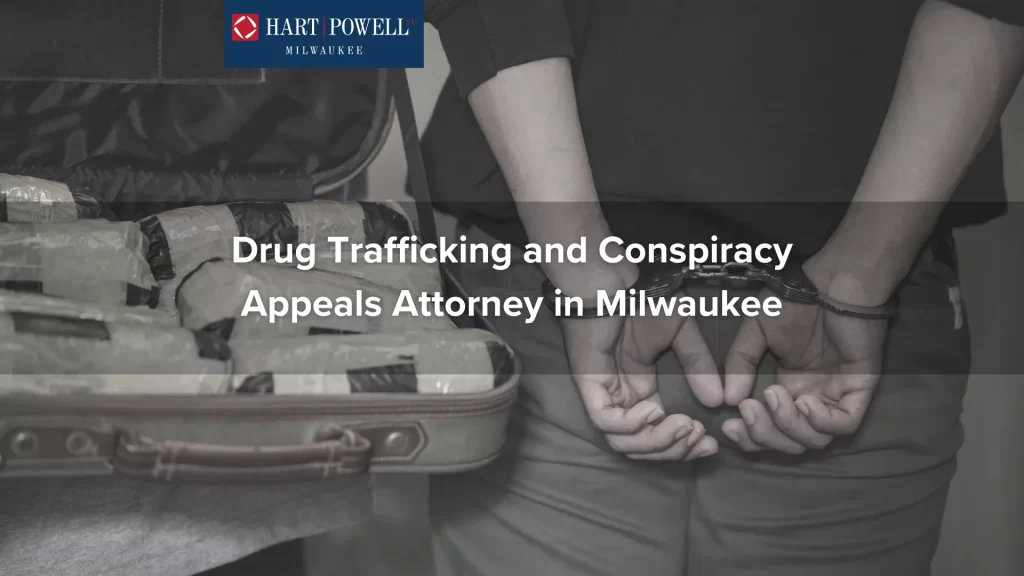
You’ve been charged with a drug trafficking crime, and it has been the most traumatic experience of your life. Until now. Because things just went from bad to worse. You went to trial, and now you’ve been convicted and sentenced for that offense. You’re convinced that it’s not a matter of whether you’ll do time – the only question is how much time. But it’s not time to give up yet.
Before you do anything else, call the Milwaukee criminal appeals attorneys of Hart Powell, S.C. at [phone-name] or contact us online. You’ll get a straightforward explanation of how to appeal your conviction and an honest assessment of your chances of getting the conviction overturned on appeal from attorneys who do this work every day. The criminal appeals process leaves little margin for error, so you need a fierce advocate who knows the ropes and can give you the best shot at success on appeal. You need Hart Powell, S.C..
What’s the Basic Process for Filing an Appeal of My Drug Trafficking or Conspiracy Conviction?
After you have exhausted all efforts to reverse the conviction in the trial court through post-trial motions, the only way to challenge the conviction is to file an appeal with the appellate court. To be successful, you must prove that the trial court committed errors during your trial that materially adversely affected the result and ultimately deprived you of a fair trial or appropriate sentencing decision. You have to challenge the notion that the prosecutor proved all of the elements of the offense for which you were convicted beyond a reasonable doubt or point out other fundamental errors in the trial. You need an experienced attorney who can tell you what you can argue and what you can’t when appealing a drug trafficking/conspiracy conviction from the outset.
Your criminal appeals attorney from Hart Powell, S.C. can help you identify which issues are appealable and then counsel you on which of those issues provides you the best odds of getting the conviction reversed and why. Our veteran criminal appeals attorneys have helped numerous clients overturn trial court convictions by identifying errors by the trial court that deprived the client of a fair trial.
While we are working with you to determine the best options for pursuing your appeal, we will ask the trial court (or appellate court, if necessary) to allow you to remain free on bond (stay your sentence). We’ll make the request based on proof that you have legitimate grounds for challenging the conviction and/or sentencing and on the assurance that you will not flee the jurisdiction during the appeal. If either court approves our motion to stay, you will remain free while we litigate your appeal.
What Issues Can I Raise on Appeal?
There are specific, formal rules that apply to an appeal. It is not like a new trial where you get to bring in new evidence, have new witnesses testify or, in most cases, make legal arguments that you did not assert before, during, or after trial. The appellate court will only review original documents and the official record of the testimony of the witnesses, the arguments of counsel, the jury instructions, and the trial court’s rulings. The court must then decide whether the error we’ve presented affected the outcome so significantly that you are entitled to a new trial or other relief.
Three of the most common arguments raised in appeals seeking to overturn convictions in drug trafficking and conspiracy cases are:
- The trial court admitted improper evidence and allowed the jury to consider it (such as statements taken before you were read your rights).
- Your attorney in the trial court made significant errors that fundamentally affected the case.
- The court imposed a sentence that was beyond the range considered appropriate under the sentencing guidelines.
What Are the Important Stages of My Criminal Appeal?
 Notice of Intent. Once the trial court completes the sentencing process, you have twenty days to file a Notice of Intent to Appeal to preserve your right to challenge the conviction on the merits.
Notice of Intent. Once the trial court completes the sentencing process, you have twenty days to file a Notice of Intent to Appeal to preserve your right to challenge the conviction on the merits.- Notice of Appeal. This document informs the trial court, the appellate court, and the State that you are officially challenging your conviction. After you file the Notice of Appeal, there are several administrative steps required to get the record of all of the testimony and the exhibits from the trial court to the appellate court so the appellate court will be able to review the originals from the trial.
- Your Opening Appellate Brief. This is the first of two briefs we will file on your behalf in the appellate court. In this document, we identify for the appellate court the exact issues that the trial court got wrong and explain in detail why we claim the trial court made a mistake. We must cite specific documents or other tangible evidence admitted into the record (what drugs were allegedly found, by whom in whose possession, in what quantity, etc.), witness testimony, the court’s rulings, and other details that illustrate the court’s error. We must also point out how prior decisions where the appellate court reversed the decision of the trial court apply to the facts of your case.
- The State’s Brief and Your Reply Brief. The State has an opportunity to file its own appellate brief in which it argues that the facts presented to the trial court and the law the trial court followed support keeping your conviction in place. We then will have one more opportunity to challenge the State’s position and to remind the appellate court of why the conviction should be reversed.
- Oral Argument, Consideration, and Decision. In most cases, the appellate court will allow us and the attorney for the State to appear in person to present the most important issues and argue about how the facts and law support our positions. The appellate judges can ask the attorneys questions about the facts and law on which each side relies. The judges will then meet in private over time to come to a decision about whether or not your conviction should be reversed. This can take an excruciatingly long time – usually at least nine months but often over a year – while they decide whether to affirm the trial court (leave your conviction in place) or reverse the trial court (vacate your conviction and require a new trial or other relief).
Contact Us
Call Hart Powell, S.C. at (414) 271-9595 to set up an appointment with one of our veteran drug trafficking/conspiracy appellate attorneys to learn about your options on appeal.

